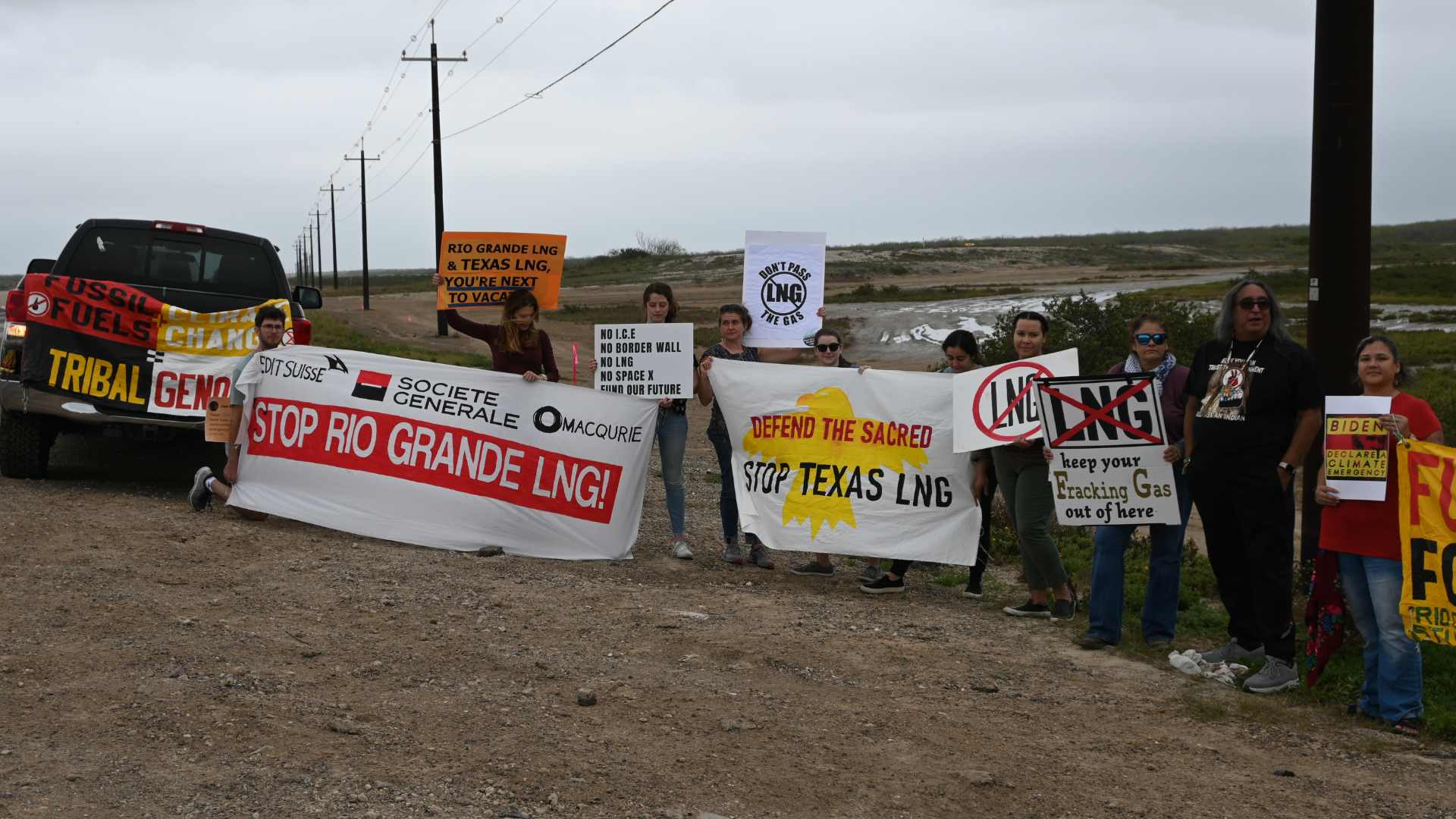
South Texas Communities escalate opposition to Rio Grande LNG
January 24, 2024
South Texas Communities and PESP escalate opposition to Rio Grande LNG terminal at Oregon Investment Council meeting
OIC faces scrutiny for $350 million Investment in the controversial LNG project
Building on recent efforts, South Texas communities, along with the Private Equity Stakeholder Project (PESP), are intensifying their call to halt the buildout of the proposed Rio Grande Liquefied Natural Gas (LNG) terminal in Brownsville, Texas. At the January 24 meeting of the Oregon Investment Council (OIC), community members, tribal leaders, and PESP staff will call on OIC to help end the dangerous LNG project.
Private equity firm Global Infrastructure Partners (GIP) has a substantial $3.5 billion investment in Rio Grande LNG, making the firm the largest investor with a minimum 46% ownership stake in the project. GIP has recently been in the spotlight this month with the announcement of its potential acquisition by the $10 trillion asset manager BlackRock.
Because of its large fund commitment to GIP, OIC is exposed to, and well-placed to address, the financial, social, and ecological risks of the Rio Grande LNG terminal. Last year, OIC invested $350 million into Global Infrastructure Partners’ Fund V, the GIP fund invested in Rio Grande LNG.
There has been significant community and legal opposition to this project for years. If built, the Rio Grande LNG terminal is estimated to emit the equivalentemissions of 44 coal power plants every year, about 163 million tons of carbon dioxide equivalent.
In November 2023, PESP and Texas community members confronted and educated the Washington State Investment Board (WSIB) about its $400 million commitment to Global Infrastructure Partners’ Fund V. Now, the attendance at the upcoming OIC meeting indicates an intensification by activists and affected community members to encourage the investors of this project to put pressure on GIP.
The Rio Grande LNG terminal would be built onthe sacred land of the Carrizo Comecrudo Tribe of Texas, yet the Rio Grande project, regulatory agencies, and banks have all failed to consult with the tribe on local impacts. Additionally,the facilities would significantly degrade local fishing, shrimping and natural tourism industries putting communities’ livelihoods at risk.
“Global Infrastructure Partners should halt the Rio Grande LNG because this dangerous gas project will destroy lands that are sacred to our Tribe and release pollution that is damaging to the community’s health,” said Juan Mancias, Chairman of the Carrizo Comecrudo Tribe of Texas. “Much of our sacred land is being bulldozed by Rio Grande LNG’s land-clearing equipment and even more so by fossil fuel colonization such as fracking. As a great grandfather and chairman of the Carrizo Comecrudo Tribe, we are fighting back to protect our remaining sacred lands and access for our Tribe’s future generations. We are calling on the Oregon Investment Council & GIP not to be complicit with this destruction.”
Due to these risks, communities across South Texas have opposed Rio Grande LNG. The city ofPort Isabel filed a lawsuit against the Federal Energy Regulatory Agency (FERC), alleging the agency had not conducted a sufficient environmental review. TheLaguna Vista Town Council, the South Padre Island City Council, and Long Island Village unanimously adopted resolutions opposing the Rio Grande LNG terminal. The Point Isabel School District that represents these communitiesrejected a tax abatement offer from Rio Grande LNG.
“I’m at the pension fund meeting today because I have spent many volunteer hours studying flora and fauna and bird watching at the Lomas ecosystems that Rio Grande LNG is already negatively impacting with their excavation equipment,” said Patricia Rubio of Another Gulf Is Possible Collaborative. “Our communities have already made it clear that we oppose this destruction by Rio Grande LNG because these endangered ecosystems and clean waters for fishing & shrimping are our livelihoods. Why is your pension fund investing in the destruction of our community’s resources? You must join us in demanding GIP halt the Rio Grande LNG project.”
Future global demand for LNG is highly uncertain. The IEA forecast that demand for gas, oil and coal will all peak before 2030, and has noted that demand for gas growth has slowed considerably, leading to concerns about a “glut of LNG.” Sinking millions of dollars into massive gas infrastructure exposes OIC to financial and environmental risks. Additionally, GIP’s Rio Grande LNG project is among several proposed LNG terminals that have been “repeatedly delayed due to rising construction, labor and borrowing costs” and volatile gas prices, according to Reuters.
“Climate change is a systemic risk present in OIC’s current private equity portfolio,” said Nichole Heil, Climate Research and Campaign Coordinator at PESP. “With hundreds of millions invested in such a controversial project as Rio Grande, Oregonians’ pension money is facing a real financial threat. If the Rio Grande project moves forward, OIC’s capital will also be complicit in the destruction of South Texas communities, residents’ actual livelihood, and the history of tribal lands. These reputational risks are completely avoidable for OIC and its pensioners. However, as an investor OIC is well-positioned to ask that GIP halt any further development of Rio Grande LNG. South Texas does not want its land bulldozed by private equity firms.”
Global Infrastructure Partners has also seen headlines recently for the announcement of its proposed acquisition by BlackRock. With momentum building against the Rio Grande LNG terminal, BlackRock will also shoulder the responsibility of GIP’s harmful LNG backing. If the GIP sale continues to completion, PESP urges BlackRock to also heed the calls of community groups to halt Rio Grande.
You can view the agenda and live stream of the Oregon Investment Council meeting here. The meeting begins at 9:00 a.m. PT.
You can watch previous comments to the Washington State Investment Board here.
